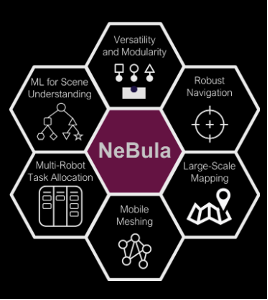

To enable fully Autonomous operations on Extreme environments and other planetary bodies, JPL is developing Next Generation Autonomy and AI Solutions for Space Exploration. In particular, JPL develops a cutting-edge autonomy solution, referred to as NeBula (Networked Belief-aware Perceptual Autonomy) that aims at providing a holistic solution for multi-robot systems autonomously operating in unknown environments and extreme terrains under uncertainty. NeBula is a modular software solution, specifically designed to address stochasticity and uncertainty in various elements of the mission, including sensing, environment, motion, system health, and communication, among others. NeBula has been implemented on multiple heterogeneous robotic platforms (wheeled, legged, tracked and flying vehicles).
NeBula has demonstrated across various terrestrial or planetary-analog missions. Using a NeBula-powered team of robots, JPL’s team CoSTAR has won the DARPA Subterranean challenge, Phase 2, in Feb 2020. NeBula has also led to the first-ever fully-autonomous exploration of long and deep Martian-analog caves (up to 100s of meters) with a team of robots.

Robots powered by NeBula

Main thrusts and features of NeBula
Some of the main thrusts and features of NeBula are:
For the full list of these capabilities and features, please see here